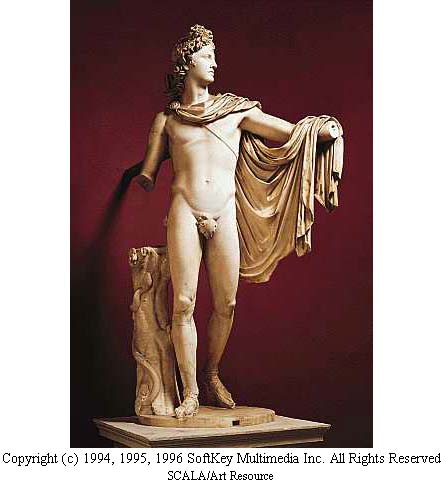|
|
|
Amazon.com International Sites :
USA, United Kingdom, Germany, France
Books about Apollo :
The Face of Apollo : The First Book of the
Gods (Saberhagen, Fred, Book of the Gods, 1St.)
Of the 12 great gods of Greece, the handsomest and best loved was Apollo. He was the god of light, youth, beauty,
and prophecy. The priestess of the oracle at Delphi was his servant.
One of the earliest deeds of the young Apollo was the slaying of the deadly serpent Python. No man dared to approach
the beast, which lived in the hills near Delphi. When the people asked Apollo to save them, he came down from Mount
Olympus with his silver bow and a quiver of golden arrows. Apollo used one of the arrows to kill the serpent. In
memory of this victory Apollo was believed to have started the Pythian games, which were held every four years
in ancient Greece. The winners in feats of strength, in foot races, and in chariot races were crowned with wreaths
of laurel leaves.
Apollo was also the god of song, music, and poetry. He charmed the gods with his playing at the banquets held in
their palaces on Mount Olympus. It was said among the later Greeks that he invented both the flute and the lyre.
According to Greek mythology, Apollo was the son of Zeus and twin brother of Artemis (Diana). He was born on the
island of Delos in the Aegean Sea. His mother was the goddess Leto (Latona). Later, through confusion with Helios,
he came to be considered especially as the sun god. The Greeks connected him with agriculture and called him "protector
of the grain," "sender of fertilizing dew," "preventer of blight," "destroyer of
locusts," and "destroyer of mice." They considered him the guardian of flocks and herds and a health-giving
god. He was hailed as the "god of the silver bow" and in wartime as "the helper."
At Delphi in central Greece, near the foot of Mount Parnassus--sacred to Apollo and the Muses--was the famous oracle
of Apollo. Here his priestess made known the future to all who consulted her. She gave guidance in matters of sickness,
war and peace, and in the building of colonies. The tripod was dedicated especially to Apollo, and it was sacred
to him as the god of prophecy. He was made one of the chief gods of Rome by an edict of the Emperor Augustus. The
emperor regarded him as his patron deity and built a magnificent temple in his honor.

The 'Apollo Belvedere' is a Roman copy of a Greek bronze. --SCALA/Art Resource
Apollo was represented by ancient sculptors as a beautiful youth with flowing hair tied in a knot above his forehead,
crowned with a wreath of laurel and bearing his lyre or bow. The most famous statue of him is the 'Apollo Belvedere',
which is a Roman copy of a Greek bronze original and is in the Vatican Museum in Rome.
Amazon.com International Sites :